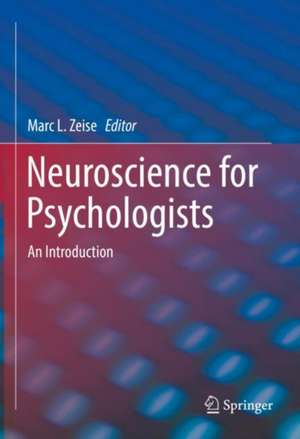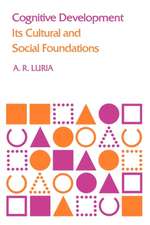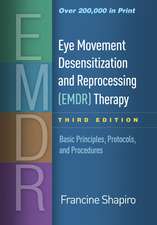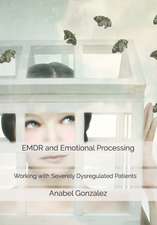Neuroscience for Psychologists: An Introduction
Editat de Marc L. Zeiseen Limba Engleză Hardback – dec 2020
The book is divided in two parts. The first part presents core concepts in neuroscience:
- Electrical Signals in the Nervous System
- Basics of Neuropharmacology
- Neurotransmitters
The second part presents an overview of the neuroscience fields of special interest for psychology:
- Clinical Neuropharmacology
- Inputs, Outputs and Multisensory Processing
- Neural Plasticity in Humans
- Mathematical Modeling in Neuroscience
- Subjective Experience and its Neural Basis
Neuroscience for Psychologists aims to fill a gap in the teaching literature by providing an introductory text for psychology students that can also be used in other social sciences courses, as well as a complement in courses of neurophysiology, neuropharmacology or similar in careers outside as well as inside biological or medical fields. Students of data sciences, chemistry and physics as well as engineering interested in neurosciencewill also profit from the text.
Preț: 641.47 lei
Preț vechi: 833.07 lei
-23% Nou
Puncte Express: 962
Preț estimativ în valută:
122.78€ • 133.42$ • 103.21£
122.78€ • 133.42$ • 103.21£
Carte tipărită la comandă
Livrare economică 17-23 aprilie
Preluare comenzi: 021 569.72.76
Specificații
ISBN-13: 9783030476441
ISBN-10: 3030476448
Pagini: 372
Ilustrații: X, 318 p. 108 illus., 71 illus. in color.
Dimensiuni: 168 x 240 x 27 mm
Greutate: 0.68 kg
Ediția:1st ed. 2021
Editura: Springer International Publishing
Colecția Springer
Locul publicării:Cham, Switzerland
ISBN-10: 3030476448
Pagini: 372
Ilustrații: X, 318 p. 108 illus., 71 illus. in color.
Dimensiuni: 168 x 240 x 27 mm
Greutate: 0.68 kg
Ediția:1st ed. 2021
Editura: Springer International Publishing
Colecția Springer
Locul publicării:Cham, Switzerland
Cuprins
1. Introduction.- 2.Electrical Signals in the Nervous System.- 3. Basics of Neuropharmacology.- 4. The Transmitters.- 5. Clinical Neuropharmacology.- 6. Inputs, Outputs and Multisensory Processing.- 7. Neural Plasticity in Humans.- 8. Mathematical Modeling in Neuroscience.- 9. Subjective Experience and its Neural Basis.- 10. Tools of Neuroscience.
Notă biografică
Marc Zeise is a German neurobiologist who has been working for four decades in investigation and teaching. Having studied biology in Munich and Tübingen he worked on colour processing in the amphibian retina in the Max-Planck-Institute of Biophysical Chemistry and in the Ruhr-University Bochum until its doctorate. He performed postdoctoral studies at the Max-Planck-Institutes for Brain Research and for Psychiatry in Frankfurt and Munich, respectively, elaborating cellular mechanisms of action of diverse neuroactive substances such as baclofen, NMDA, valproate, melatonin, neurosteroids and cytokines. In 1993 he went to Chile doing research on the effects of organophosphate pesticides and methylbromide on the Central Nervous System. Later, in 2004, he became a professor at the School of Psychology at the University of Santiago de Chile. There, he teaches Neuroscience courses and does research on the plastic/metaplastic effects of psychostimulants.
Textul de pe ultima copertă
This textbook is intended to give an introduction to neuroscience for students and researchers with no biomedical background. Primarily written for psychologists, this volume is a digest giving a rapid but solid overview for people who want to inform themselves about the core fields and core concepts in neuroscience but don’t need so many anatomical or biochemical details given in “classical” textbooks for future doctors or biologists. It does not require any previous knowledge in basic science, such as physics or chemistry. On the other hand, it contains chapters that do go beyond the issues dealt with in most neuroscience textbooks: One chapter about mathematical modelling in neuroscience and another about “tools of neuroscience” explaining important methods.
The book is divided in two parts. The first part presents core concepts in neuroscience:
The second part presents an overview of the neuroscience fields of special interest for psychology:
Neuroscience for Psychologists aims to fill a gap in the teaching literature by providing an introductory text for psychology students that can also be used in other social sciences courses, as well as a complement in courses of neurophysiology, neuropharmacology or similar in careers outside as well as inside biological or medical fields. Students of data sciences, chemistry and physics as well as engineering interested in neurosciencewill also profit from the text.
The book is divided in two parts. The first part presents core concepts in neuroscience:
- Electrical Signals in the Nervous System
- Basics of Neuropharmacology
- Neurotransmitters
The second part presents an overview of the neuroscience fields of special interest for psychology:
- Clinical Neuropharmacology
- Inputs, Outputs and Multisensory Processing
- Neural Plasticity in Humans
- Mathematical Modeling in Neuroscience
- Subjective Experience and its Neural Basis
Neuroscience for Psychologists aims to fill a gap in the teaching literature by providing an introductory text for psychology students that can also be used in other social sciences courses, as well as a complement in courses of neurophysiology, neuropharmacology or similar in careers outside as well as inside biological or medical fields. Students of data sciences, chemistry and physics as well as engineering interested in neurosciencewill also profit from the text.
Caracteristici
Gives a solid introduction to neuroscience for students and researchers with no biomedical background Provides a basic guide for psychologists and other social scientists who want to understand key concepts in neuroscience Can be used as a complement in courses of neurophysiology and neuropharmacology in careers outside biological or medical fields





